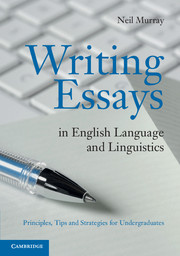 Writing Essays in English Language and Linguistics
Writing Essays in English Language and Linguistics Book contents
- Frontmatter
- Contents
- Acknowledgements
- Introduction
- A guide to the book's icons: what do they mean?
- Part 1 The basics
- Part 2 Getting down to writing
- Chapter 3 Analysing and answering the question
- Chapter 4 The writing process
- Chapter 5 Writing an introduction
- Chapter 6 Writing the body of your essay
- Chapter 7 Writing summaries and conclusions
- Chapter 8 Referencing and quotations
- Chapter 9 Stylistic issues
- Chapter 10 Writing up small-scale research projects or dissertations
- Frequently asked questions
- Linguistics glossary
- Task key
- References
- Index
Chapter 7 - Writing summaries and conclusions
from Part 2 - Getting down to writing
Published online by Cambridge University Press: 05 June 2012
- Frontmatter
- Contents
- Acknowledgements
- Introduction
- A guide to the book's icons: what do they mean?
- Part 1 The basics
- Part 2 Getting down to writing
- Chapter 3 Analysing and answering the question
- Chapter 4 The writing process
- Chapter 5 Writing an introduction
- Chapter 6 Writing the body of your essay
- Chapter 7 Writing summaries and conclusions
- Chapter 8 Referencing and quotations
- Chapter 9 Stylistic issues
- Chapter 10 Writing up small-scale research projects or dissertations
- Frequently asked questions
- Linguistics glossary
- Task key
- References
- Index
Summary
‘I've never really understood the difference between a summary and a conclusion. Conclusions are kind of like introductions for me: I'm never sure what to write, and it usually feels like I'm just repeating what I've already said. So what's the point?’
What's a summary and how's it different from a conclusion?
A summary is a brief restatement – or recap – of the main points you've presented in your discussion. Although it will often precede the conclusion, it's also sometimes presented as part of the conclusion. In either case, though, it's a way of reminding your reader of the main ideas you discussed so that the conclusion can be read and understood more easily with those ideas fresh in their mind.
As the quotation that begins this chapter indicates, students sometimes confuse summaries and conclusions, so let's begin by making a simple distinction between the two. A summary, because it's merely a restatement of ideas already mentioned, adds no new information. A conclusion, on the other hand, does add new information: it takes the ideas discussed in the body of your writing and then implicitly asks (and explicitly answers) the question, ‘What general observations can we make about those ideas? What do we learn from them? What do they tell us?’ In other words, a conclusion makes general statements about the ideas presented in your main discussion; statements containing ideas that will most likely not have appeared elsewhere in your writing. The new information comes not from adding to those ideas but by commenting on them.
- Type
- Chapter
- Information
- Writing Essays in English Language and LinguisticsPrinciples, Tips and Strategies for Undergraduates, pp. 108 - 116Publisher: Cambridge University PressPrint publication year: 2012


